| [version en cours de rédaction] | [version en cours de rédaction] |
| Ligne 13 : | Ligne 13 : | ||
!Wiring Details | !Wiring Details | ||
|- | |- | ||
| − | |Emergency Stop Button | + | |Emergency Stop Button Module |
(Eaton) | (Eaton) | ||
|{{#annotatedImageLight:Fichier:Manual-Fault Finding Emergency Stop Circuits Screenshot 2025-01-27 142921.png|0=200px|hash=|jsondata=|mediaClass=Image|type=frameless|align=center|src=https://stuga.dokit.app/images/f/f6/Manual-Fault_Finding_Emergency_Stop_Circuits_Screenshot_2025-01-27_142921.png|href=./Fichier:Manual-Fault Finding Emergency Stop Circuits Screenshot 2025-01-27 142921.png|resource=./Fichier:Manual-Fault Finding Emergency Stop Circuits Screenshot 2025-01-27 142921.png|caption=|size=200px}} | |{{#annotatedImageLight:Fichier:Manual-Fault Finding Emergency Stop Circuits Screenshot 2025-01-27 142921.png|0=200px|hash=|jsondata=|mediaClass=Image|type=frameless|align=center|src=https://stuga.dokit.app/images/f/f6/Manual-Fault_Finding_Emergency_Stop_Circuits_Screenshot_2025-01-27_142921.png|href=./Fichier:Manual-Fault Finding Emergency Stop Circuits Screenshot 2025-01-27 142921.png|resource=./Fichier:Manual-Fault Finding Emergency Stop Circuits Screenshot 2025-01-27 142921.png|caption=|size=200px}} | ||
| Ligne 25 : | Ligne 25 : | ||
|Wired with 2 N/C and 1 N/O contact. The estop loops use the N/C contacts and the feedback (input to PLC) uses the N/O contact. | |Wired with 2 N/C and 1 N/O contact. The estop loops use the N/C contacts and the feedback (input to PLC) uses the N/O contact. | ||
|- | |- | ||
| − | |Emergency Stop Button | + | |Emergency Stop Button Module |
(Telemecanique) | (Telemecanique) | ||
| Ligne 38 : | Ligne 38 : | ||
|Wired with 2 N/C and 1 N/O contact. The estop loops use the N/C contacts and the feedback (input to PLC) uses the N/O contact. | |Wired with 2 N/C and 1 N/O contact. The estop loops use the N/C contacts and the feedback (input to PLC) uses the N/O contact. | ||
|- | |- | ||
| − | | | + | |Emergency Stop Button Panel Mount (Eaton) |
|{{#annotatedImageLight:Fichier:Machine Safety Components and Wiring Screenshot 2025-01-29 155726.png|0=169px|hash=|jsondata=|mediaClass=Image|type=frameless|align=center|src=https://stuga.dokit.app/images/7/7f/Machine_Safety_Components_and_Wiring_Screenshot_2025-01-29_155726.png|href=./Fichier:Machine Safety Components and Wiring Screenshot 2025-01-29 155726.png|resource=./Fichier:Machine Safety Components and Wiring Screenshot 2025-01-29 155726.png|caption=|size=169px}} | |{{#annotatedImageLight:Fichier:Machine Safety Components and Wiring Screenshot 2025-01-29 155726.png|0=169px|hash=|jsondata=|mediaClass=Image|type=frameless|align=center|src=https://stuga.dokit.app/images/7/7f/Machine_Safety_Components_and_Wiring_Screenshot_2025-01-29_155726.png|href=./Fichier:Machine Safety Components and Wiring Screenshot 2025-01-29 155726.png|resource=./Fichier:Machine Safety Components and Wiring Screenshot 2025-01-29 155726.png|caption=|size=169px}} | ||
|Button Module - E0000078 | |Button Module - E0000078 | ||
| Ligne 46 : | Ligne 46 : | ||
| − | N/O Button Contact - | + | N/O Button Contact - E0000347 |
|Wired with 2 N/C and 1 N/O contact. The estop loops use the N/C contacts and the feedback (input to PLC) uses the N/O contact. | |Wired with 2 N/C and 1 N/O contact. The estop loops use the N/C contacts and the feedback (input to PLC) uses the N/O contact. | ||
|- | |- | ||
| − | | | + | |Emergency Stop Button Module (Schneider) |
|{{#annotatedImageLight:Fichier:Machine Safety Components and Wiring Screenshot 2025-01-29 155750.png|0=200px|hash=|jsondata=|mediaClass=Image|type=frameless|align=center|src=https://stuga.dokit.app/images/3/3e/Machine_Safety_Components_and_Wiring_Screenshot_2025-01-29_155750.png|href=./Fichier:Machine Safety Components and Wiring Screenshot 2025-01-29 155750.png|resource=./Fichier:Machine Safety Components and Wiring Screenshot 2025-01-29 155750.png|caption=|size=200px}} | |{{#annotatedImageLight:Fichier:Machine Safety Components and Wiring Screenshot 2025-01-29 155750.png|0=200px|hash=|jsondata=|mediaClass=Image|type=frameless|align=center|src=https://stuga.dokit.app/images/3/3e/Machine_Safety_Components_and_Wiring_Screenshot_2025-01-29_155750.png|href=./Fichier:Machine Safety Components and Wiring Screenshot 2025-01-29 155750.png|resource=./Fichier:Machine Safety Components and Wiring Screenshot 2025-01-29 155750.png|caption=|size=200px}} | ||
|Button Module - E0000062 | |Button Module - E0000062 | ||
| Ligne 57 : | Ligne 57 : | ||
| | | | ||
|- | |- | ||
| − | | | + | |Interlock Guardswitch (Bernstein) |
|{{#annotatedImageLight:Fichier:Machine Safety Components and Wiring Screenshot 2025-01-29 155831.png|0=93px|hash=|jsondata=|mediaClass=Image|type=frameless|align=center|src=https://stuga.dokit.app/images/9/92/Machine_Safety_Components_and_Wiring_Screenshot_2025-01-29_155831.png|href=./Fichier:Machine Safety Components and Wiring Screenshot 2025-01-29 155831.png|resource=./Fichier:Machine Safety Components and Wiring Screenshot 2025-01-29 155831.png|caption=|size=93px}} | |{{#annotatedImageLight:Fichier:Machine Safety Components and Wiring Screenshot 2025-01-29 155831.png|0=93px|hash=|jsondata=|mediaClass=Image|type=frameless|align=center|src=https://stuga.dokit.app/images/9/92/Machine_Safety_Components_and_Wiring_Screenshot_2025-01-29_155831.png|href=./Fichier:Machine Safety Components and Wiring Screenshot 2025-01-29 155831.png|resource=./Fichier:Machine Safety Components and Wiring Screenshot 2025-01-29 155831.png|caption=|size=93px}} | ||
|Guardswitch Unit - E0001568 | |Guardswitch Unit - E0001568 | ||
| Ligne 65 : | Ligne 65 : | ||
|Wired with 2 N/C contacts (out of 3), 1N/O contact and 1 solenoid (Door Unlock). The 2 N/C contacts are split into 2 categories, you have the N/C contact that monitors the state of the solenoid, the N/C contact that monitors the state of the key actuation and a N/C contact that monitors both in series. The N/O contact monitors the state of the key actuation. The solenoid wiring is for unlocking and locking the guardswitch. When no voltage is present on the solenoid wires, the guardswitch will be locked and when voltage is applied, the guardswitch will be unlocked. This is know as a 'power to unlock' guardswitch and this is the type we use on the Stuga machines. | |Wired with 2 N/C contacts (out of 3), 1N/O contact and 1 solenoid (Door Unlock). The 2 N/C contacts are split into 2 categories, you have the N/C contact that monitors the state of the solenoid, the N/C contact that monitors the state of the key actuation and a N/C contact that monitors both in series. The N/O contact monitors the state of the key actuation. The solenoid wiring is for unlocking and locking the guardswitch. When no voltage is present on the solenoid wires, the guardswitch will be locked and when voltage is applied, the guardswitch will be unlocked. This is know as a 'power to unlock' guardswitch and this is the type we use on the Stuga machines. | ||
|- | |- | ||
| − | | | + | |Guardswitch (Guard Master) |
|{{#annotatedImageLight:Fichier:Machine Safety Components and Wiring Screenshot 2025-01-29 155933.png|0=200px|hash=|jsondata=|mediaClass=Image|type=frameless|align=center|src=https://stuga.dokit.app/images/5/50/Machine_Safety_Components_and_Wiring_Screenshot_2025-01-29_155933.png|href=./Fichier:Machine Safety Components and Wiring Screenshot 2025-01-29 155933.png|resource=./Fichier:Machine Safety Components and Wiring Screenshot 2025-01-29 155933.png|caption=|size=200px}} | |{{#annotatedImageLight:Fichier:Machine Safety Components and Wiring Screenshot 2025-01-29 155933.png|0=200px|hash=|jsondata=|mediaClass=Image|type=frameless|align=center|src=https://stuga.dokit.app/images/5/50/Machine_Safety_Components_and_Wiring_Screenshot_2025-01-29_155933.png|href=./Fichier:Machine Safety Components and Wiring Screenshot 2025-01-29 155933.png|resource=./Fichier:Machine Safety Components and Wiring Screenshot 2025-01-29 155933.png|caption=|size=200px}} | ||
|Guardswitch Unit (2NC+1NO) - E0001535 | |Guardswitch Unit (2NC+1NO) - E0001535 | ||
| Ligne 73 : | Ligne 73 : | ||
|Wired with 2 N/C and 1 N/O contact. The estop loops use the N/C contacts and the feedback (input to PLC) uses the N/O contact. | |Wired with 2 N/C and 1 N/O contact. The estop loops use the N/C contacts and the feedback (input to PLC) uses the N/O contact. | ||
|- | |- | ||
| − | | | + | |Interlock Guardswitch (Omron) |
|{{#annotatedImageLight:Fichier:Machine Safety Components and Wiring Screenshot 2025-01-29 155911.png|0=100px|hash=|jsondata=|mediaClass=Image|type=frameless|align=center|src=https://stuga.dokit.app/images/1/12/Machine_Safety_Components_and_Wiring_Screenshot_2025-01-29_155911.png|href=./Fichier:Machine Safety Components and Wiring Screenshot 2025-01-29 155911.png|resource=./Fichier:Machine Safety Components and Wiring Screenshot 2025-01-29 155911.png|caption=|size=100px}} | |{{#annotatedImageLight:Fichier:Machine Safety Components and Wiring Screenshot 2025-01-29 155911.png|0=100px|hash=|jsondata=|mediaClass=Image|type=frameless|align=center|src=https://stuga.dokit.app/images/1/12/Machine_Safety_Components_and_Wiring_Screenshot_2025-01-29_155911.png|href=./Fichier:Machine Safety Components and Wiring Screenshot 2025-01-29 155911.png|resource=./Fichier:Machine Safety Components and Wiring Screenshot 2025-01-29 155911.png|caption=|size=100px}} | ||
| | | | ||
|Wired with 2 N/C contacts (out of 3), 1N/O contact and 1 solenoid (Door Unlock). The 2 N/C contacts are split into 2 categories, you have the N/C contact that monitors the state of the solenoid, the N/C contact that monitors the state of the key actuation and a N/C contact that monitors both in series. The N/O contact monitors the state of the key actuation. The solenoid wiring is for unlocking and locking the guardswitch. When no voltage is present on the solenoid wires, the guardswitch will be locked and when voltage is applied, the guardswitch will be unlocked. This is know as a 'power to unlock' guardswitch and this is the type we use on the Stuga machines. | |Wired with 2 N/C contacts (out of 3), 1N/O contact and 1 solenoid (Door Unlock). The 2 N/C contacts are split into 2 categories, you have the N/C contact that monitors the state of the solenoid, the N/C contact that monitors the state of the key actuation and a N/C contact that monitors both in series. The N/O contact monitors the state of the key actuation. The solenoid wiring is for unlocking and locking the guardswitch. When no voltage is present on the solenoid wires, the guardswitch will be locked and when voltage is applied, the guardswitch will be unlocked. This is know as a 'power to unlock' guardswitch and this is the type we use on the Stuga machines. | ||
|- | |- | ||
| − | | | + | |Guardswitch (Omron) |
|{{#annotatedImageLight:Fichier:Machine Safety Components and Wiring Screenshot 2025-01-29 155859.png|0=127px|hash=|jsondata=|mediaClass=Image|type=frameless|align=center|src=https://stuga.dokit.app/images/0/0c/Machine_Safety_Components_and_Wiring_Screenshot_2025-01-29_155859.png|href=./Fichier:Machine Safety Components and Wiring Screenshot 2025-01-29 155859.png|resource=./Fichier:Machine Safety Components and Wiring Screenshot 2025-01-29 155859.png|caption=|size=127px}} | |{{#annotatedImageLight:Fichier:Machine Safety Components and Wiring Screenshot 2025-01-29 155859.png|0=127px|hash=|jsondata=|mediaClass=Image|type=frameless|align=center|src=https://stuga.dokit.app/images/0/0c/Machine_Safety_Components_and_Wiring_Screenshot_2025-01-29_155859.png|href=./Fichier:Machine Safety Components and Wiring Screenshot 2025-01-29 155859.png|resource=./Fichier:Machine Safety Components and Wiring Screenshot 2025-01-29 155859.png|caption=|size=127px}} | ||
| | | | ||
|Wired with 2 N/C and 1 N/O contact. The estop loops use the N/C contacts and the feedback (input to PLC) uses the N/O contact. | |Wired with 2 N/C and 1 N/O contact. The estop loops use the N/C contacts and the feedback (input to PLC) uses the N/O contact. | ||
|- | |- | ||
| − | | | + | |Interlock Guardswitch (Guard Master) |
|{{#annotatedImageLight:Fichier:Machine Safety Components and Wiring Screenshot 2025-01-29 160048.png|0=193px|hash=|jsondata=|mediaClass=Image|type=frameless|align=center|src=https://stuga.dokit.app/images/d/db/Machine_Safety_Components_and_Wiring_Screenshot_2025-01-29_160048.png|href=./Fichier:Machine Safety Components and Wiring Screenshot 2025-01-29 160048.png|resource=./Fichier:Machine Safety Components and Wiring Screenshot 2025-01-29 160048.png|caption=|size=193px}} | |{{#annotatedImageLight:Fichier:Machine Safety Components and Wiring Screenshot 2025-01-29 160048.png|0=193px|hash=|jsondata=|mediaClass=Image|type=frameless|align=center|src=https://stuga.dokit.app/images/d/db/Machine_Safety_Components_and_Wiring_Screenshot_2025-01-29_160048.png|href=./Fichier:Machine Safety Components and Wiring Screenshot 2025-01-29 160048.png|resource=./Fichier:Machine Safety Components and Wiring Screenshot 2025-01-29 160048.png|caption=|size=193px}} | ||
| | | | ||
| | | | ||
|- | |- | ||
| − | | | + | |Hinge Safety Switch (Leuze) |
|{{#annotatedImageLight:Fichier:Machine Safety Components and Wiring Screenshot 2025-01-29 160117.png|0=146px|hash=|jsondata=|mediaClass=Image|type=frameless|align=center|src=https://stuga.dokit.app/images/d/dc/Machine_Safety_Components_and_Wiring_Screenshot_2025-01-29_160117.png|href=./Fichier:Machine Safety Components and Wiring Screenshot 2025-01-29 160117.png|resource=./Fichier:Machine Safety Components and Wiring Screenshot 2025-01-29 160117.png|caption=|size=146px}} | |{{#annotatedImageLight:Fichier:Machine Safety Components and Wiring Screenshot 2025-01-29 160117.png|0=146px|hash=|jsondata=|mediaClass=Image|type=frameless|align=center|src=https://stuga.dokit.app/images/d/dc/Machine_Safety_Components_and_Wiring_Screenshot_2025-01-29_160117.png|href=./Fichier:Machine Safety Components and Wiring Screenshot 2025-01-29 160117.png|resource=./Fichier:Machine Safety Components and Wiring Screenshot 2025-01-29 160117.png|caption=|size=146px}} | ||
| | | | ||
|''Wired with 2 N/C and 1 N/O contact via an m12 8pin cable. The estop loops use the N/C contacts and the feedback (input to PLC) uses the N/O contact.'' | |''Wired with 2 N/C and 1 N/O contact via an m12 8pin cable. The estop loops use the N/C contacts and the feedback (input to PLC) uses the N/O contact.'' | ||
|- | |- | ||
| − | | | + | |Hinge Safety Switch (Bernstein) |
|{{#annotatedImageLight:Fichier:Machine Safety Components and Wiring Screenshot 2025-01-29 160142.png|0=180px|hash=|jsondata=|mediaClass=Image|type=frameless|align=center|src=https://stuga.dokit.app/images/5/53/Machine_Safety_Components_and_Wiring_Screenshot_2025-01-29_160142.png|href=./Fichier:Machine Safety Components and Wiring Screenshot 2025-01-29 160142.png|resource=./Fichier:Machine Safety Components and Wiring Screenshot 2025-01-29 160142.png|caption=|size=180px}} | |{{#annotatedImageLight:Fichier:Machine Safety Components and Wiring Screenshot 2025-01-29 160142.png|0=180px|hash=|jsondata=|mediaClass=Image|type=frameless|align=center|src=https://stuga.dokit.app/images/5/53/Machine_Safety_Components_and_Wiring_Screenshot_2025-01-29_160142.png|href=./Fichier:Machine Safety Components and Wiring Screenshot 2025-01-29 160142.png|resource=./Fichier:Machine Safety Components and Wiring Screenshot 2025-01-29 160142.png|caption=|size=180px}} | ||
| | | | ||
| | | | ||
|- | |- | ||
| − | | | + | |Magnetic Safety Switch (Omron) |
|{{#annotatedImageLight:Fichier:Machine Safety Components and Wiring Screenshot 2025-01-29 160452.png|0=200px|hash=|jsondata=|mediaClass=Image|type=frameless|align=center|src=https://stuga.dokit.app/images/7/7c/Machine_Safety_Components_and_Wiring_Screenshot_2025-01-29_160452.png|href=./Fichier:Machine Safety Components and Wiring Screenshot 2025-01-29 160452.png|resource=./Fichier:Machine Safety Components and Wiring Screenshot 2025-01-29 160452.png|caption=|size=200px}} | |{{#annotatedImageLight:Fichier:Machine Safety Components and Wiring Screenshot 2025-01-29 160452.png|0=200px|hash=|jsondata=|mediaClass=Image|type=frameless|align=center|src=https://stuga.dokit.app/images/7/7c/Machine_Safety_Components_and_Wiring_Screenshot_2025-01-29_160452.png|href=./Fichier:Machine Safety Components and Wiring Screenshot 2025-01-29 160452.png|resource=./Fichier:Machine Safety Components and Wiring Screenshot 2025-01-29 160452.png|caption=|size=200px}} | ||
| | | | ||
Version du 29 janvier 2025 à 17:42
This page contains all of the different electrical safety devices used on the Stuga machines and how they are wired.
Sommaire
| Component Name | Component Picture | Part Numbers | Wiring Details |
|---|---|---|---|
| Emergency Stop Button Module
(Eaton) |
Button Module - E0001072
|
Wired with 2 N/C and 1 N/O contact. The estop loops use the N/C contacts and the feedback (input to PLC) uses the N/O contact. | |
| Emergency Stop Button Module
(Telemecanique) |
Button Module - E0000452
|
Wired with 2 N/C and 1 N/O contact. The estop loops use the N/C contacts and the feedback (input to PLC) uses the N/O contact. | |
| Emergency Stop Button Panel Mount (Eaton) | Button Module - E0000078
|
Wired with 2 N/C and 1 N/O contact. The estop loops use the N/C contacts and the feedback (input to PLC) uses the N/O contact. | |
| Emergency Stop Button Module (Schneider) | Button Module - E0000062
|
||
| Interlock Guardswitch (Bernstein) | Guardswitch Unit - E0001568
|
Wired with 2 N/C contacts (out of 3), 1N/O contact and 1 solenoid (Door Unlock). The 2 N/C contacts are split into 2 categories, you have the N/C contact that monitors the state of the solenoid, the N/C contact that monitors the state of the key actuation and a N/C contact that monitors both in series. The N/O contact monitors the state of the key actuation. The solenoid wiring is for unlocking and locking the guardswitch. When no voltage is present on the solenoid wires, the guardswitch will be locked and when voltage is applied, the guardswitch will be unlocked. This is know as a 'power to unlock' guardswitch and this is the type we use on the Stuga machines. | |
| Guardswitch (Guard Master) | Guardswitch Unit (2NC+1NO) - E0001535
|
Wired with 2 N/C and 1 N/O contact. The estop loops use the N/C contacts and the feedback (input to PLC) uses the N/O contact. | |
| Interlock Guardswitch (Omron) | Wired with 2 N/C contacts (out of 3), 1N/O contact and 1 solenoid (Door Unlock). The 2 N/C contacts are split into 2 categories, you have the N/C contact that monitors the state of the solenoid, the N/C contact that monitors the state of the key actuation and a N/C contact that monitors both in series. The N/O contact monitors the state of the key actuation. The solenoid wiring is for unlocking and locking the guardswitch. When no voltage is present on the solenoid wires, the guardswitch will be locked and when voltage is applied, the guardswitch will be unlocked. This is know as a 'power to unlock' guardswitch and this is the type we use on the Stuga machines. | ||
| Guardswitch (Omron) | Wired with 2 N/C and 1 N/O contact. The estop loops use the N/C contacts and the feedback (input to PLC) uses the N/O contact. | ||
| Interlock Guardswitch (Guard Master) | |||
| Hinge Safety Switch (Leuze) | Wired with 2 N/C and 1 N/O contact via an m12 8pin cable. The estop loops use the N/C contacts and the feedback (input to PLC) uses the N/O contact. | ||
| Hinge Safety Switch (Bernstein) | |||
| Magnetic Safety Switch (Omron) | Wired with 2 N/C and 1 N/O contact. The estop loops use the N/C contacts and the feedback (input to PLC) uses the N/O contact. |
Below is a list of other devices fitted on the Stuga machines which are considered safety related but are not necessarily related or impact the main safety circuit.
010-n- Light curtain - The light curtains are wired with 2 OSSD outputs (Output Signal Switching Device). These are outputs from the light curtain that interact with a designated relay which then controls 2 switches which are wired into the safety circuit. The light curtain is considered part of the safety circuit but it is actually the relay that the light curtain controls which does the safety circuit switching!
011-n- Zero Speed Detector - This is a device that is used to monitor the status of a 3 phase motor. The zero speed detector is not wired into the safety circuit. However, the zero speed detector does stop the interlock guardswitches from unlocking if it does not detect zero speed. It can sometimes be diagnosed that a guardswitch has failed when actually the issue is with the zero speed detector!
012-n- Safety Timer - On some models of the ZX5 you will find a yellow safety timer fitted in the machining centre cabinet. This timer is not wired into the safety circuit but it is controlled by it! This timer allows us a safe amount of time before actuating something. In the case of the machining centre, the timer is used to monitor the safety circuit and when it detects the safety circuit is inactive (emergency stopped pressed for example), it triggers a set time to not allow the door unlock signal to activate. This does 2 things, firstly it only allows the doors to open when the machine is safe and also it allows us to set a time to make sure the machine has come to a complete stop before allowing the doors to open.
Draft

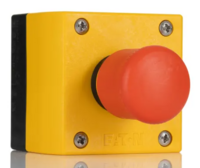
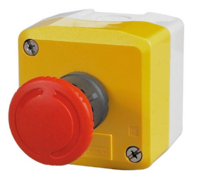
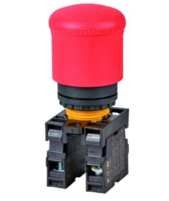
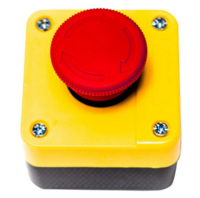

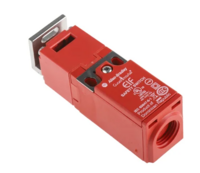
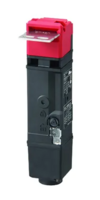
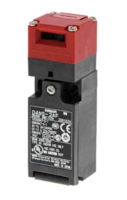
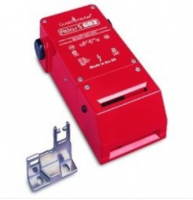
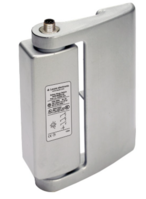
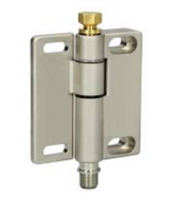
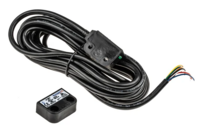
 Français
Français English
English Deutsch
Deutsch Español
Español Italiano
Italiano Português
Português